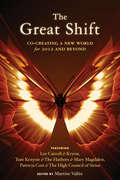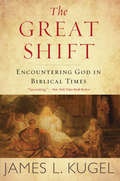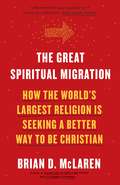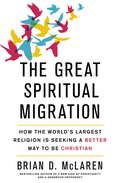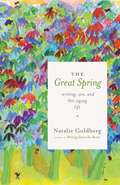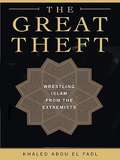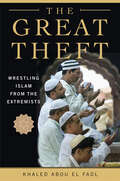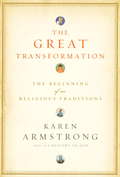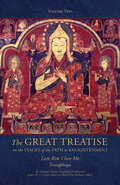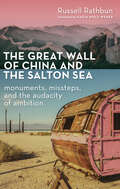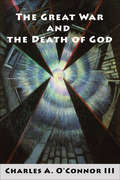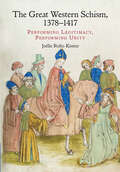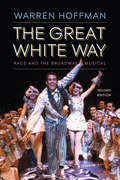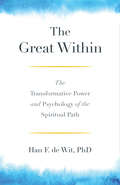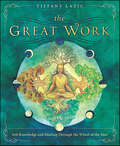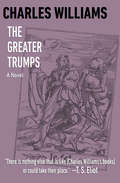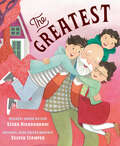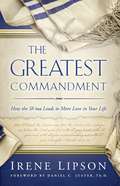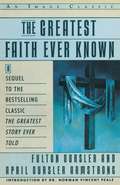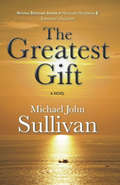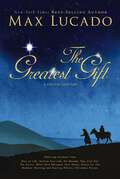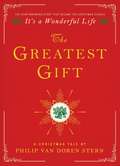- Table View
- List View
The Great Shift: Co-Creating a New World for 2012 and Beyond
by Patricia Cori Thomas Kenyon Lee Kryon CarrollThis extraordinary book brings together many sources of important information on the changes occurring within our world, ourselves, and the evolution of consciousness leading up to the year 2012. <P><P>The text is addressed in part to Lightworkers, for whom the energy shift now gearing up has been ongoing for at least the last twenty years. The time is getting closer. The Great Shift is a progress report from the field and the messages are positive. "You don't have to logically do anything but 'show up' with spiritual intent, and the DNA quantum field is activated in your body," Kryon says. He tells us to expect changes and peace we may have never thought to see in our lifetimes, even in the Middle East. He says, "God is not a controlling force. Look for the love."Thomas Kenyon channeling the Hathors, a group consciousness entity, reminds us, "It is your attention to an event that makes it conscious." Kenyon also explains what channeled material is, which is important in understanding how we co-create our own world: "From the standpoint of neuropsychology, channeled information is just another expression of our brain/mind potential . . . a movement into the unknown territory of one's own psyche to see what emerges in terms of contact (with other intelligences) and information." The Hathors message for what is now and what is to come: "It is so simple, it is forgotten. . . . Find a way to live your life in joy and happiness." Mary Magdalene, through Thomas Kenyon, makes it clear that restoring the balance between male and female energies will mean good things for men as well as women and will reignite our creative potency. Patricia Cori channeling the High Council of Sirius reminds us that the future is never predetermined and the past is an illusion--different for each of us.
The Great Shift: Encountering God in Biblical Times
by James L. KugelThe renowned author of How to Read the Biblereveals how a pivotal transformation in spiritual experience during the biblical era made us who we are today. A great mystery lies at the heart of the Bible. Early on, people seem to live in a world entirely foreign to our own. God appears to Abraham and Sarah, Jacob and others; God buttonholes Moses and Isaiah and Jeremiah and tells them what to say. Then comes the Great Shift, and Israelites stop seeing God or hearing the divine voice. Instead, later Israelites are &“in search of God,&” reaching out to a distant, omniscient deity in prayers, as people have done ever since. What brought about this change? The answers come from ancient texts, archaeology and anthropology, and even modern neuroscience. They concern the origins of the modern sense of self and the birth of a worldview that has been ours ever since. James Kugel, whose strong religious faith shines through his scientific reckoning with the Bible and the ancient world, has written a masterwork that will be of interest to believers and nonbelievers alike, a profound meditation on encountering God, then and now.&“Fascinating.&”—The New York Times Book Review&“Biblical exegesis at its best: a brilliant and sensitive reading of ancient texts, all with an eye to making them meaningful to our time by making sense of what they meant in their own.&”—Kirkus Reviews(starred review)&“A magnificent job of bringing important ideas from the academy to a broad readership . . . Kugel gives readers a sense of history&’s convoluted texture, its ironies, and thus its beauty.&”—The Jewish Review of Books
The Great Spiritual Migration: How the World's Largest Religion Is Seeking a Better Way to Be Christian
by Brian D. MclarenThe Christian story, from Genesis until now, is fundamentally about people on the move--outgrowing old, broken religious systems and embracing new, more redemptive ways of life. It's time to move again. Brian McLaren, a leading voice in contemporary religion, argues that-- notwithstanding the dire headlines about the demise of faith and drop in church attendance--Christian faith is not dying. Rather, it is embarking on a once-in-an-era spiritual shift. For millions, the journey has already begun. Drawing from his work as global activist, pastor, and public theologian, McLaren challenges readers to stop worrying, waiting, and indulging in nostalgia, and instead, to embrace the powerful new understandings that are reshaping the church. In The Great Spiritual Migration, he explores three profound shifts that define the change: Spiritually, growing numbers of Christians are moving away from defining themselves by lists of beliefs and toward a way of life defined by love Theologically, believers are increasingly rejecting the image of God as a violent Supreme Being and embracing the image of God as the renewing Spirit at work in our world for the common good Missionally, the faithful are identifying less with organized religion and more with organizing religion--spiritual activists dedicated to healing the planet, building peace, overcoming poverty and injustice, and collaborating with other faiths to ensure a better future for all of us With his trademark brilliance and compassion, McLaren invites readers to seize the moment and set out on the most significant spiritual pilgrimage of our time: to help Christianity become more Christian.
The Great Spiritual Migration: How the World's Largest Religion is Seeking a Better Way to Be Christian (Way Of Life Ser.)
by Brian D. MclarenMany people experience Christianity as a system of belief, focused on an exclusive Supreme Being who favours some and rejects others, and is defended by a set of change-averse, self-protecting institutions. In The Great Spiritual Migration, Brian McLaren proposes that this conventional understanding of Christianity is ripe for a conversion: from system of belief to way of life, from exclusive Supreme Being to the loving, healing, reconciling Spirit embodied in Jesus, and from an organised institutional religion that supports an unjust status quo to an organising movement-building religion that helps a better world be born. Drawing from his work as a pastor, speaker, ecumenical networker and activist, McLaren issues a call and offers a plan for radical change that can shift the direction of Christian faith to be more in sync with its founder, more life-giving for individual Christians and congregations - and more of a life-giving resource for the whole world.
The Great Spring: Writing, Zen, and This Zigzag Life
by Natalie GoldbergFrom beloved writing teacher and author of the best-selling Writing Down the Bones: a treasury of personal stories reflecting a life filled with journeys—inner and outer—zigzagging around the world and home again.Here, Natalie Goldberg, "a writer both energized and enlightened" (Julia Cameron), shares those vivid moments that have wakened her to new ways of being. We follow alongside her mapless meanderings in the New Mexican desert and her pilgrimages to Bob Dylan's birthplace and to Larry McMurtry's dusty Texas ghost town of rare books. We feel her deep hunger while she sits zazen in a monastery in Japan, and her profound loss when she hears of the passing of a dear friend while teaching in the French countryside.Through it all, she remains grounded in a life informed by two constants: the practices of writing and of Zen. With humor and insight, Natalie encircles around the essential questions these paths compel her toward: Where does this life lead? Who are we?This is a book to be relished one awakening at a time. Each story is a reminder that no matter how hard the situation or desolate you may feel, spring will come again, breaking through a cold winter, bringing early yellow forsythia flowers. And the Great Spring of enlightenment—that sudden rush of acceptance, pain cracking open, obstructions shattering—will also burst forth.
The Great TV Turn-Off (The Cul-De-Sac Kids #18)
by Beverly LewisIt's "TV Turn-Off Week" across America, and Eric Hagel proposes that the kids on Blossom Hill Lane--adults, too!--don't watch a speck of TV for seven days. But midway through the week, Eric catches Mr. Tressler sneaking a peek at his TV. What will they do now?
The Great Theft: Wrestling Islam from the Extremists
by Khaled Abou El FadlAn Islamic jurist and American lawyer offers a passionate defense of Islam against the encroaching tide of fundamentalists corrupting the true faith. Seduced by the lure of fundamentalism himself as a teenager in Egypt, he rejected that path once he began studying Islamic law. A longtime moderate Muslims everywhere as one of the only learned voices defending the faith, he has received death threats from extremists for that very same reason. As quick to criticize the failure of Islamic leadership in the U.S. as abroad, Abou El Fadl remains a brave voice against the pressures and threats of Wahhabi extremism. The Great Theft will present the beliefs and practices of moderate Muslims, and identify the points of difference and disagreement with the fundamentalist-puritan practice of Islam. This book offers a vision for Moderate Islam- past, present, and future. Abou El Fadl is dedicated to providing the tools necessary to help readers reclaim an understanding of Islam that is grounded in the tradition's history and law.
The Great Theft: Wrestling Islam from the Extremists
by Khaled Abou El Fadl“Those looking for an understanding of the Muslim world and its relationship to the West . . . will find this book invaluable” (Dallas Morning News).The Great Theft is an impassioned defense of Islam against the encroaching power of extremists. Khaled Abou El Fadl, one of the world’s preeminent Islamic scholars and an accomplished Islamic jurist, roots his arguments in long-standing historical legal debates, delineating point by point beliefs and practices of moderate Muslims and distinguishing these texts from the corrupting influences of extremists. From the role of women in Islam to the nature of jihad, and from democracy and human rights to terrorism and warfare, Abou El Fadl builds a vital vision for a moderate Islam. At long last, all who oppose extremism have a desperately needed voice to help reclaim Islam’s great moral tradition.
The Great Transformation: The Beginning of Our Religious Traditions
by Karen ArmstrongFrom one of the world's leading writers on religion and the highly acclaimed author of the bestselling A History of God,The Battle for God and The Spiral Staircase, comes a major new work: a chronicle of one of the most important intellectual revolutions in world history and its relevance to our own time. In one astonishing, short period - the ninth century BCE - the peoples of four distinct regions of the civilized world created the religious and philosophical traditions that have continued to nourish humanity into the present day: Confucianism and Daoism in China; Hinduism and Buddhism in India; monotheism in Israel; and philosophical rationalism in Greece. Historians call this the Axial Age because of its central importance to humanity's spiritual development. Now, Karen Armstrong traces the rise and development of this transformative moment in history, examining the brilliant contributions to these traditions made by such figures as the Buddha, Socrates, Confucius and Ezekiel. Armstrong makes clear that despite some differences of emphasis, there was remarkable consensus among these religions and philosophies: each insisted on the primacy of compassion over hatred and violence. She illuminates what this "family" resemblance reveals about the religious impulse and quest of humankind. And she goes beyond spiritual archaeology, delving into the ways in which these Axial Age beliefs can present an instructive and thought-provoking challenge to the ways we think about and practice religion today. A revelation of humankind's early shared imperatives, yearnings and inspired solutions - as salutary as it is fascinating. Excerpt from The Great Transformation: In our global world, we can no longer afford a parochial or exclusive vision. We must learn to live and behave as though people in remote parts of the globe were as important as ourselves. The sages of the Axial Age did not create their compassionate ethic in idyllic circumstances. Each tradition developed in societies like our own that were torn apart by violence and warfare as never before; indeed, the first catalyst of religious change was usually a visceral rejection of the aggression that the sages witnessed all around them. ... All the great traditions that were created at this time are in agreement about the supreme importance of charity and benevolence, and this tells us something important about our humanity.
The Great Treatise on the Stages of the Path to Enlightenment
by Tsong-Kha-PaThe first volume of the fifteenth-century spiritual classic that condenses the enormous breadth of Buddhist teachings into one easy-to-follow meditation manual. The Great Treatise on the Stages of the Path to Enlightenment (Tib. Lam rim chen mo) is one of the brightest jewels in the world's treasury of sacred literature. The author, Tsong-kha-pa, completed it in 1402, and it soon became one of the most renowned works of spiritual practice and philosophy in the world of Tibetan Buddhism. Because it condenses all the exoteric sūtra scriptures into a meditation manual that is easy to understand, scholars and practitioners rely on its authoritative presentation as a gateway that leads to a full understanding of the Buddha's teachings. Tsong-kha-pa took great pains to base his insights on classical Indian Buddhist literature, illustrating his points with classical citations as well as with sayings of the masters of the earlier Kadampa tradition. In this way the text demonstrates clearly how Tibetan Buddhism carefully preserved and developed the Indian Buddhist traditions. This first of three volumes covers all the practices that are prerequisite for developing the spirit of enlightenment (bodhicitta).
The Great UFO Chase (Thorne Twins Adventure Books, #17)
by Dayle Courtney John HamWhen the mysterious Mr. Kingsley comes to their home town of Ivy, Illinois, on government business, the Thorne twins are convinced that he has something to do with UFO's.
The Great Wall of China and the Salton Sea: Monuments, Missteps, and the Audacity of Ambition
by Russell RathbunWe've been building and making things ever since we stumbled out of Paradise. Some of those things are incredible continuations of God's creation, while others are nothing but ambitious catastrophes. We continue making, says Russell Rathbun, but we've lost ourselves in the process. So how do we find ourselves again—rebuild our connections to each other, the earth, maybe even God? In search of an answer, Rathbun drives cross-country to the Salton Sea and takes a trip to China's Great Wall, interspersing his traveling revelations with engaging musings on Madame Mao's Gang of Four, Grandpa Webb's family secret, the Great Flood and the Tower of Babel, and a host of other subjects that grab his attention. With cheeky wit and sharp insight, Rathbun uncovers a way of finding ourselves and the deep connections we long for in an increasingly complex world.
The Great War and the Death of God
by Charles A. O'ConnorA compelling analysis of how World War I spurred the rise of atheism and the subsequent effect on Western theology, philosophy, literature, and art. The catastrophic Great War left humanity in a world no longer trustworthy and reassuring but seemingly meaningless and indifferent. Instead of redressing humanity’s cosmic alienation, postwar Western culture abandoned its concern for cosmic meaning, lost its confidence in human reason, and enabled the scientific worldview of neo-Darwinian materialism to emerge and eventually dominate the Western mind. According to the proponents of that worldview, science is the only source of genuine truth, nature is the product of a blind evolutionary process, and reality at bottom is just physics and chemistry. Thus, God is dead and continued belief in a transcendently purposeful universe is intellectually indefensible and either disingenuous or delusional. By turning away from the eternal questions about the nature of reality, Western culture effectively ceded unwarranted credibility and prominence to neo-Darwinian materialism, including its recently strident New Atheism.“O’Connor revisits the 20th century’s journey from Nietzsche’s declaration of the ‘death of God’ to the rise of materialism as the dominant worldview of western intelligentsia. We live in a world that has largely expelled both mind and meaning from the citadels of serious intellectual pursuit, and O’Connor’s book is a fascinating and scholarly expedition into the ‘how’ and ‘why’ of that troubling development.” —Carter Phipps, author of Evolutionaries“I found this topic to be top-rate. The book is well researched and conceived, nicely narrated and analyzed, and an original body of inquiry into a challenging, fascinating intellectual tradition.” —Ronald M. Johnson, Professor Emeritus of American History, Georgetown University
The Great Western Schism, 1378–1417
by Joëlle Rollo-KosterThe Great Schism divided Western Christianity between 1378 and 1417. Two popes and their courts occupied the see of St. Peter, one in Rome, and one in Avignon. Traditionally, this event has received attention from scholars of institutional history. In this book, by contrast, Joëlle Rollo-Koster investigates the event through the prism of social drama. Marshalling liturgical, cultural, artistic, literary and archival evidence, she explores the four phases of the Schism: the breach after the 1378 election, the subsequent division of the Church, redressive actions, and reintegration of the papacy in a single pope. Investigating how popes legitimized their respective positions and the reception of these efforts, Rollo-Koster shows how the Schism influenced political thought, how unity was achieved, and how the two capitals, Rome and Avignon, responded to events. Rollo-Koster's approach humanizes the Schism, enabling us to understand the event as it was experienced by contemporaries.
The Great White Way: Race and the Broadway Musical
by Warren HoffmanBroadway musicals are one of America’s most beloved art forms and play to millions of people each year. But what do these shows, which are often thought to be just frothy entertainment, really have to say about our country and who we are as a nation? Now in a new second edition, The Great White Way is the first book to reveal the racial politics, content, and subtexts that have haunted musicals for almost one hundred years from Show Boat (1927) to Hamilton (2015). This revised edition includes a new introduction and conclusion, updated chapters, as well as a brand-new chapter that looks at the blockbuster musicals The Book of Mormon and Hamilton. Musicals mirror their time periods and reflect the political and social issues of their day. Warren Hoffman investigates the thematic content of the Broadway musical and considers how musicals work on a structural level, allowing them to simultaneously present and hide their racial agendas in plain view of their audiences. While the musical is informed by the cultural contributions of African Americans and Jewish immigrants, Hoffman argues that ultimately the history of the American musical is the history of white identity in the United States. Presented chronologically, The Great White Way shows how perceptions of race altered over time and how musicals dealt with those changes. Hoffman focuses first on shows leading up to and comprising the Golden Age of Broadway (1927–1960s), then turns his attention to the revivals and nostalgic vehicles that defined the final quarter of the twentieth century. He offers entirely new and surprising takes on shows from the American musical canon—Show Boat (1927), Oklahoma! (1943), Annie Get Your Gun (1946), The Music Man (1957), West Side Story (1957), A Chorus Line (1975), and 42nd Street (1980), among others. In addition to a new chapter on Hamilton and The Book of Mormon, this revised edition brings The Great White Way fully into the twenty-first century with an examination of jukebox musicals and the role of off-Broadway and regional theaters in the development of the American musical. New archival research on the creators who produced and wrote these shows, including Leonard Bernstein, Jerome Robbins, Stephen Sondheim, and Edward Kleban, will have theater fans and scholars rethinking forever how they view this popular American entertainment.
The Great Within: The Transformative Power and Psychology of the Spiritual Path
by Han F. de WitA book for anyone who wants to understand the psychological nature of contemplative practice as a transformative process.Renowned psychologist Han de Wit explores the psychology found in age-old contemplative traditions and takes us deep into the mind of the spiritual practitioner. Using Buddhism as a framework, and drawing insights from several world religions, he demonstrates how contemplative practices can open us up to our own wisdom and compassion. The result is a vivid illumination of the process of spiritual transformation and an important contribution to contemporary psychology and psychotherapy.
The Great Work: Self-Knowledge and Healing Through the Wheel of the Year
by Tiffany LazicFusing ancient Western spirituality, energy work, and psychology, The Great Work is a practical guide to personal transformation season by season. Learn to be truly holistic by incorporating key physical, emotional, and energetic practices into your life at times when the natural tides are in harmony with your process.The Great Work captures the core essence of each festival with eight key themes that span the annual cycle—a cycle that reflects human development and experience. Discover how Yule can alleviate a painful childhood, how Beltane can facilitate conscious relationships, and how Mabon can assist with determining your life's purpose. Find guidance through daily journal questions, elemental meditations, and the author's unique energy-healing technique of Hynni. With this invaluable resource for your journey of inner alchemy, you'll develop an intimate connection with the earth's impulse to create balance and harmony.Praise:"Tiffany Lazic weaves together psychology, myth, meditation and keen observation of the natural world, creating an invaluable and original resource for healing work of all kinds. Inviting and accessible to all readers."—Elizabeth Cunningham, author of The Maeve Chronicles"The Great Work presents inspiring insights and practical exercises that help unlock the alchemical mysteries at the heart of the Eightfold Path, and which facilitate a deep connection with the cycles of nature as they reveal their transformational powers in all of us."—Jhenah Telyndru, author of Avalon Within
The Greater Trumps: A Novel
by Charles WilliamsIn this classic tale of spirituality, morality, and the occult, a dark plot to murder an unsuspecting Englishman who possesses the world&’s rarest tarot deck unleashes uncontrollable elemental forces The original and most mystical of all playing-card decks, the tarot has seduced seekers of otherworldly knowledge for centuries—and of all its cards, the most potent are the twenty-two symbolic images that comprise the Greater Trumps. By a strange twist of fate, the very first tarot deck, dating back centuries, has come into the possession of Lothair Coningsby, a uniquely unimaginative Englishman. Though he has no intention of relinquishing his treasure, there are others who covet the tarot&’s power. Henry Lee, for one—fiancé of Coningsby&’s beautiful daughter, Nancy—is driven by an obligation even deeper than his devotion to his beloved. Henry is of Gipsy blood, and the Romany believe that they alone are the true guardians of the mystical tarot. Invited to spend the holidays at the out-of-the-way home of Aaron Lee, Henry&’s grandfather, the unsuspecting Coningsbys are blind to the chilling conspiracy taking shape around them. For on this stormy Christmas Day, their hosts are preparing to commit foul murder to gain possession of the coveted occult deck, unleashing devastating primal forces that no human could possibly contain. The brilliant fiction of Charles Williams, who was a member of the Inklings alongside fellow Oxfordians C. S. Lewis, J. R. R. Tolkien, and Owen Barfield, is considered to be among the most provocative, imaginative, and intelligent explorations of spirituality and the supernatural produced during the twentieth century. The proof lies in his magnificent classic The Greater Trumps, a many-layered tale of hubris and faith that is arguably one of the greatest mystical thrillers of all time.
The Greatest
by Veera HiranandaniIn this poignant tribute to grandparents everywhere, a grandfather reflects on his loving relationship with his three grandchildren. This story beautifully captures how love can make anyone "the greatest" in someone's eyes.From Newbery Honor author Veera Hiranandani and National Book Award finalist Vesper Stamper comes a poignant story about the love between grandparents and grandchildren.Grandpa loves Sundays-- that's when his three grandchildren come to visit. They act out plays, catch fireflies in the yard, and celebrate Jewish holidays together. His grandchildren bestow affection and admiration on him. Sometimes, though, he wonders why they think he's so great? Should he tell them that he's just an average, ordinary man?Here is a book that wonderfully captures how simple, everyday moments can turn into treasured memories, and how the power of love makes us all the "greatest" to somebody.
The Greatest Commandment: How the Sh’ma Leads to More Love in Your Life
by Irene LipsonThe Messiah said the Sh'ma was the greatest commandment. This book explains why.
The Greatest Faith Ever Known
by Fulton Oursler April Oursler ArmstrongThis sequel to The Greatest Story Ever Told follows the turbulent adventures of the apostles Paul, Peter, and James after the crucifixion of Christ in their struggle to spread the Good News to the world. Faithfully based on the scriptures of the Acts and the Epistles, this saga of kings and jailers, of far voyages and shipwreck, of strange miracles and escapes and ultimate martyrdom, has inspired and touched generations of readers. It is a story that is timeless.
The Greatest Gift
by Michael John SullivanIs there one more miracle left?Teenager Elizabeth Stewart has been given the gift of life once more and uses it to risk everything for a close friend - even though it means leaving behind her father, Michael. Distraught, Michael poses as a Roman soldier, takes a sea journey with an Apostle, and is asked to help write part of the Gospel in his quest to safely bring his daughter home to the twenty-first century. In present time, Hewitt Paul, an embittered FBI special agent, seeks solutions to the mysteries surrounding Elizabeth and Michael's disappearance. As faith collides with cynicism and compassion faces off against cruelty, these three people will encounter the unimaginable in ways that alter their lives forever. Thrilling, illuminating, and ultimately resounding, THE GREATEST GIFT concludes the trilogy begun in NECESSARY HEARTBREAK and EVERYBODY'S DAUGHTER in awe-inspiring fashion.
The Greatest Gift
by Michael John SullivanIs there one more miracle left?Teenager Elizabeth Stewart has been given the gift of life once more and uses it to risk everything for a close friend - even though it means leaving behind her father, Michael.Distraught, Michael poses as a Roman soldier, takes a sea journey with an Apostle, and is asked to help write part of the Gospel in his quest to safely bring his daughter home to the twenty-first century.In present time, Hewitt Paul, an embittered FBI special agent, seeks solutions to the mysteries surrounding Elizabeth and Michael's disappearance.As faith collides with cynicism and compassion faces off against cruelty, these three people will encounter the unimaginable in ways that alter their lives forever.Thrilling, illuminating, and ultimately resounding, THE GREATEST GIFT concludes the trilogy begun in NECESSARY HEARTBREAK and EVERYBODY'S DAUGHTER in awe-inspiring fashion.
The Greatest Gift - A Max Lucado Digital Sampler
by Max LucadoThe Greatest Gift digital sampler includes selected excerpts from six books by New York Times best-selling author Max Lucado. They offer a glimpse into the content of these titles and the heart of the greatest gift of all time. Peek inside these books to find the perfect gift to share with someone you love this Christmas season. Excerpts are from Max on Life, Outlive Your Life, No Wonder They Call Him the Savior, When God Whispers Your Name, Grace for the Moment Morning & Evening Edition, and Christmas Stories.
The Greatest Gift: A Christmas Tale
by Philip Van Doren SternA beautiful gift edition of the heartwarming story that became the Christmas classic, It’s a Wonderful Life.For almost seventy years, people the world over have fallen in love with Frank Capra’s classic Christmas movie It’s a Wonderful Life. But few of those fans know that Capra’s film was based on a short story by author Philip Van Doren Stern, which came to Stern in a dream one night. Unable at first to find a publisher for his evocative tale about a man named George Pratt who ponders suicide until he receives an opportunity to see what the world would be like without him, Stern ultimately published the story in a small pamphlet and sent it out as his 1943 Christmas card. One of those 200 cards found its way into the hands of Frank Capra, who shared it with Jimmy Stewart, and the film that resulted became the holiday tradition we cherish today. Now fans of It’s a Wonderful Life, or anyone who loves the spirit of Christmas, can own the story that started it all in an elegant, illustrated edition that’s perfect for holiday giving. It includes an Afterword by Stern’s daughter, Marguerite Stern Robinson, that tells the story of how her father’s Christmas card became the movie beloved by generations of people around the world.
